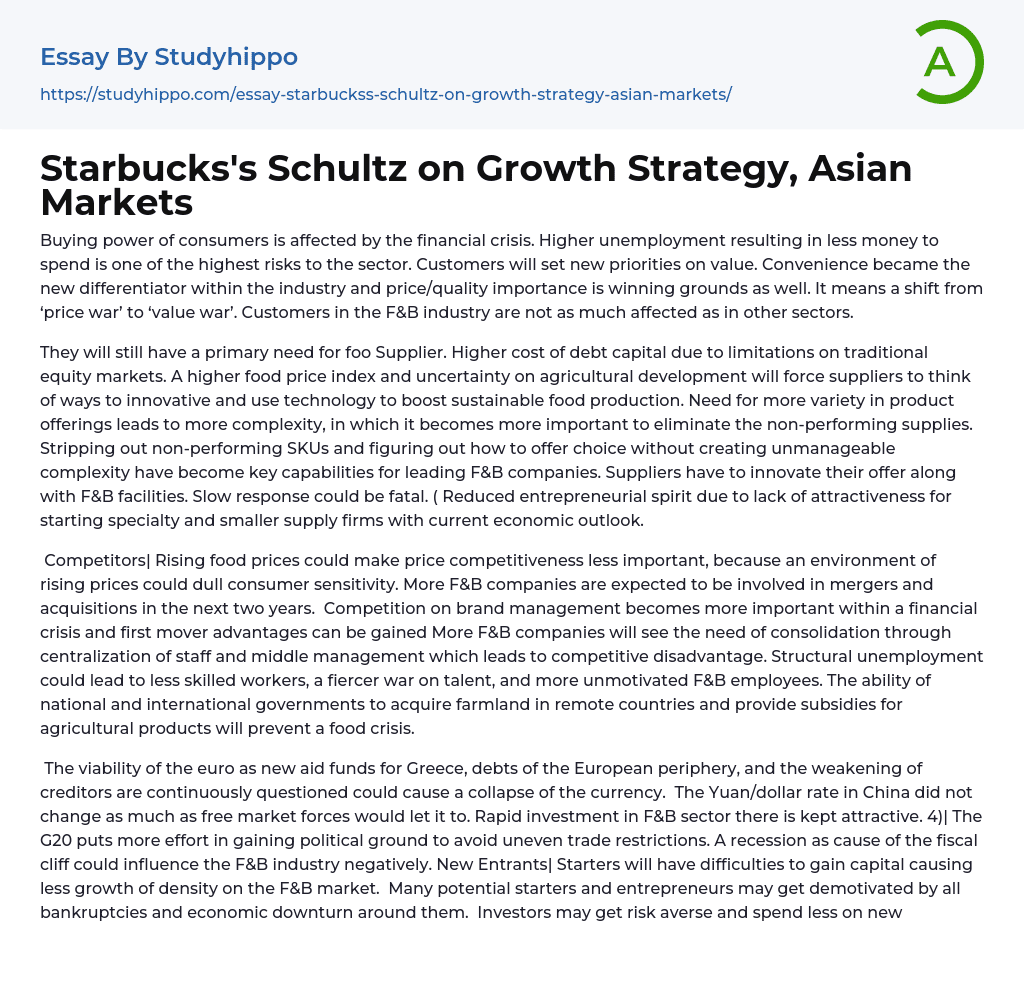

Starbucks’s Schultz on Growth Strategy, Asian Markets Essay Example
The financial crisis impacts consumers' buying power, with higher unemployment leading to reduced spending. This presents a significant risk to the industry. Customers are now prioritizing value and convenience, and the importance of price and quality is increasing. This shift signifies a move from a "price war" to a "value war." Compared to other sectors, customers in the F;B industry are less affected.
Companies in the food and beverage industry will still rely heavily on foo Supplier despite facing challenges such as higher cost of debt capital and limitations on equity markets. To combat these obstacles, suppliers must embrace innovation and technology to enhance sustainable food production and address the rising food price index and uncertain agricultural development. Additionally, the need for a diverse range of product offerings increases complexity, making it crucial for suppliers to eliminate no
...n-performing supplies. Leading F;B companies must possess the capability to offer choices without creating overwhelming complexity. Suppliers and F;B facilities must both innovate to stay competitive, as a slow response could be detrimental. The current economic outlook has reduced the entrepreneurial spirit, making it less attractive for specialty and smaller supply firms to start their businesses.
Competitors: Rising food prices may diminish the significance of price competitiveness, as higher prices might reduce consumer sensitivity. It is expected that more F;B companies will engage in mergers and acquisitions within the next two years. Brand management competition becomes more crucial during financial crises, and being the first to enter the market can provide advantages. F;B companies will recognize the necessity of consolidation through centralization of staff and middle management, which can result in a competitive disadvantage.
Structural unemployment could lead to a decrease in skilled workers, intensifying the war for talent and decreasing motivation among F;B employees. Governments, both domestic and international, have the capability to acquire farmland in remote countries and subsidize agricultural products, thus preventing a food crisis.
The viability of the euro is continuously being questioned due to new aid funds for Greece and debts of the European periphery, as well as the weakening of creditors, which could potentially lead to a collapse of the currency. In China, the Yuan/dollar rate has not fluctuated as much as it would under free market forces, which keeps rapid investment in the F;B sector there attractive. The G20 is putting more effort into gaining political ground to avoid uneven trade restrictions. A recession caused by the fiscal cliff could have a negative impact on the F;B industry. Starters in the F;B market may struggle to gain capital, resulting in less growth of density. The numerous bankruptcies and economic downturns may demotivate potential starters and entrepreneurs. Risk aversion among investors may lead to decreased spending on new entrants with the potential to become role models.
The growth of industries may be hindered due to the impact of the financial crisis on customers and regulators. Uncertainty remains high as the effects of the recession continue to be felt. Customer demands have changed and are not expected to revert back anytime soon. This could have both positive and negative consequences for the F;B industry's appeal. Due to the financial crisis, individuals may have less disposable income to spend on F&B, particularly outside of their homes.
The importance of a customer-centric focus
in the hospitality industry cannot be understated, as it makes customers more aware of the value they receive. Companies that lack this focus may face difficulties surviving. Speculations can be made about whether regulators can make or break deals and make the right recovery choices to prevent long-term economic problems. Ultimately, creating a positive investment atmosphere and business sentiment lies in the hands of politics.
The global economy has a significant impact on the competitive environment and changes in stock and food prices, making it important to consider competitors and suppliers. While the F&B industry may become more attractive with fewer players in the market, it is crucial for competitors and suppliers within the industry to focus on strategic planning for the next 5 years. By adopting a growth perspective and striving for a competitive advantage, they can proactively maintain their position instead of constantly defending their existence.
- Investing essays
- Asset essays
- Depreciation essays
- Discounted Cash Flow essays
- Foreign Direct Investment essays
- Funds essays
- Internal Rate Of Return essays
- Revenue essays
- Day Trading essays
- Futures Trading essays
- Capital market essays
- Million essays
- Payment essays
- Rate Of Return essays
- Funding essays
- Hedge Fund essays
- American Dream essays
- Barriers To Entry essays
- Capitalism essays
- Central Bank essays
- Compensation essays
- Consumerism essays
- Economic Development essays
- Economic Growth essays
- Economic Inequality essays
- Economic System essays
- Economy essays
- Employment essays
- Export essays
- Finance essays
- Free Trade essays
- Gross Domestic Product essays
- Human Development essays
- Income Inequality essays
- Industry essays
- Inflation essays
- International Business essays
- International Trade essays
- Macroeconomics essays
- Materialism essays
- Max Weber essays
- Microeconomics essays
- Minimum Wage essays
- Monetary Policy essays
- Monopoly essays
- Pricing essays
- Profit essays
- Recession essays
- resources essays
- Taxation essays



